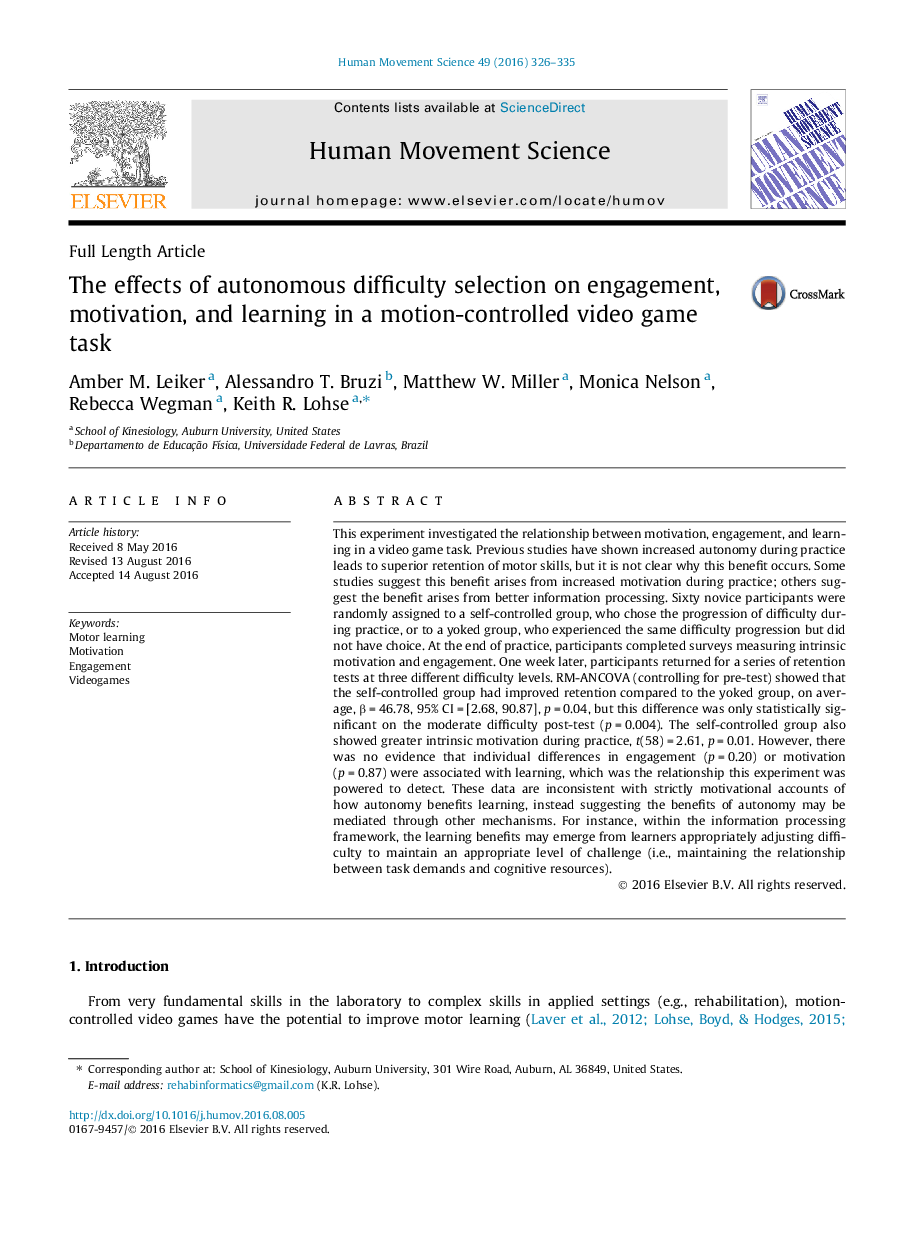| کد مقاله | کد نشریه | سال انتشار | مقاله انگلیسی | نسخه تمام متن |
|---|---|---|---|---|
| 7291350 | 1474216 | 2016 | 10 صفحه PDF | دانلود رایگان |
عنوان انگلیسی مقاله ISI
The effects of autonomous difficulty selection on engagement, motivation, and learning in a motion-controlled video game task
ترجمه فارسی عنوان
اثرات انتخاب مشروح خودمختاری بر تعامل، انگیزه و یادگیری در یک بازی ویدئویی بازی کنترل شده توسط حرکت
دانلود مقاله + سفارش ترجمه
دانلود مقاله ISI انگلیسی
رایگان برای ایرانیان
کلمات کلیدی
یادگیری موتور، انگیزه، نامزدی، بازی های ویدئویی،
موضوعات مرتبط
علوم زیستی و بیوفناوری
علم عصب شناسی
علوم اعصاب شناختی
چکیده انگلیسی
This experiment investigated the relationship between motivation, engagement, and learning in a video game task. Previous studies have shown increased autonomy during practice leads to superior retention of motor skills, but it is not clear why this benefit occurs. Some studies suggest this benefit arises from increased motivation during practice; others suggest the benefit arises from better information processing. Sixty novice participants were randomly assigned to a self-controlled group, who chose the progression of difficulty during practice, or to a yoked group, who experienced the same difficulty progression but did not have choice. At the end of practice, participants completed surveys measuring intrinsic motivation and engagement. One week later, participants returned for a series of retention tests at three different difficulty levels. RM-ANCOVA (controlling for pre-test) showed that the self-controlled group had improved retention compared to the yoked group, on average, β = 46.78, 95% CI = [2.68, 90.87], p = 0.04, but this difference was only statistically significant on the moderate difficulty post-test (p = 0.004). The self-controlled group also showed greater intrinsic motivation during practice, t(58) = 2.61, p = 0.01. However, there was no evidence that individual differences in engagement (p = 0.20) or motivation (p = 0.87) were associated with learning, which was the relationship this experiment was powered to detect. These data are inconsistent with strictly motivational accounts of how autonomy benefits learning, instead suggesting the benefits of autonomy may be mediated through other mechanisms. For instance, within the information processing framework, the learning benefits may emerge from learners appropriately adjusting difficulty to maintain an appropriate level of challenge (i.e., maintaining the relationship between task demands and cognitive resources).
ناشر
Database: Elsevier - ScienceDirect (ساینس دایرکت)
Journal: Human Movement Science - Volume 49, October 2016, Pages 326-335
Journal: Human Movement Science - Volume 49, October 2016, Pages 326-335
نویسندگان
Amber M. Leiker, Alessandro T. Bruzi, Matthew W. Miller, Monica Nelson, Rebecca Wegman, Keith R. Lohse,
